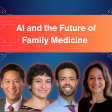A transformative journey through the legacy of racial injustice—and the path toward health equity
In April 2025, members of the UCSF Department of Family & Community Medicine (FCM) joined Glide Memorial Church and its Center for Social Justice on the Alabama Justice Pilgrimage—a powerful, multi-day journey through the heart of the U.S. civil rights movement. Led by community and faith leaders and rooted in the deep moral call to reckon with the past, the pilgrimage explores how history, trauma, and racism continue to shape public health and healthcare today.
Now in its fifth iteration since 2018, Glide’s Alabama Pilgrimage brings together diverse participants—including UCSF faculty, learners, staff, Glide clients and frontline workers, and community-based leaders—for a profound experience of collective learning. This year’s UCSF cohort included FCM’s Jonathan Butler, Shawn Demmons, Monica Hahn, Jae Rouse Iñiguez, and Roberto Ariel Vargas.
“This was bitter medicine, the necessary revisiting of histories,” said Roberto Ariel Vargas, MPH, associate director for the Center for Community Engagement, Senior Staff of the UCSF Clinical & Translational Science Institute, and one of the trip facilitators.
The group visited key landmarks in Montgomery and Selma, Alabama, including the Edmund Pettus Bridge, The Legacy Museum, and The National Memorial for Peace and Justice—sites that preserve the legacy of slavery, lynching, segregation, and ongoing injustice. They also learned about historic and contemporary justice efforts, such as the Gee’s Bend/Freedom Quilting Bee and the Black Belt Unincorporated Wastewater Program.
Shawn Demmons, MPH, FCM department member and director for The Pacific AIDS Education and Training Center’s BANCC (Bay Area, North & Central Coast) program, was deeply moved by meeting Michele Browder and seeing her “Mothers of Gynecology” monument, which honors the sacrifice of young women like Anarcha, Lucy, and Betsey, the enslaved experimental subjects of the so-called “father of gynecology,” J. Marion Sims.
“I couldn't stop looking at that monument, said Demmons. “The little pricks in the metal in the skin of each of the women was her way of showing how they were just poked and prodded so that then this doctor, J. Marion Sims, can be upheld.”
For Jae Rouse Iñiguez, MSHA, MA, associate director for operations at the Training and Health Equity (THE) Collaborative, the pilgrimage was also a reminder that health equity work can take many forms from sewage justice to quilting collectives. "I think it's just a really strong reminder for our department and our institution that all roads are going to lead to a better world in which we're going to live,” said Iñiguez. “All you need to do is walk the road.”
UCSF’s involvement in the pilgrimage stems from a vision seeded by longtime UCSF community builder Paula Fleischer and Glide’s Rabbi Michael Lezak. The journey is designed to transform not just minds, but hearts—and systems.
“As someone who grew up in the South and has visited the monuments many times, the pilgrimage is still both sobering and energizing,” said Jonathan Butler, PhD, MDiv, research faculty member at FCM and associate director of the UCSF Black Health Initiative. “This was the fuel that I needed to continue this hard work. My ancestors chose to live so that I could continue the work.”




